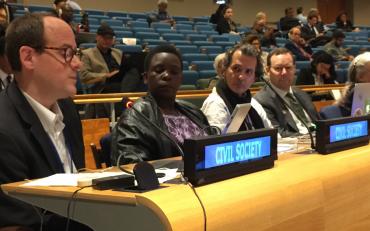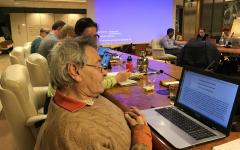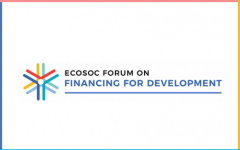The ECOSOC Forum on Financing for Development follow-up (FfD Forum) is taking place from 22-25 May at the United Nations Headquarters in New York. The FfD Forum is an inter-governmental process with universal participation mandated to review the Addis Ababa Action Agenda (Addis Agenda) and other financing for development outcomes and the means of implementation of the Sustainable Development Goals (SDGs). Read concluding blog post.
The four-day Forum has a two-day ministerial segment followed by a two-day expert segment. The FfD Forum results in inter-governmentally agreed conclusions and recommendations that are fed into the overall follow-up and review of the implementation of the 2030 Agenda for Sustainable Development in the High-level Political Forum (HLPF) on Sustainable Development.
The outcome document was adopted on 23 May that includes leave-no-one-behind language, specifically “We recommit to ensuring that no country or person is left behind and to focusing our efforts where the challenges are greatest, including by ensuring the inclusion and participation of those who are furthest behind (para 3)” and “We reaffirm that achieving gender equality, empowering all women and girls” (para 5).
The theme of leave no one behind, especially the most often left behind, was highlighted throughout the first day, including Mr. Wu Hongbo, Under-Secretary-General for Economic and Social Affairs who launched the 2017 IATF Report that contains 9 references to persons with disabilities. Additionally, Mr. Tegegnework Gettu of UNDP highlighted the inclusion of the most "vulnerable" in Financing for Development follow-up.
The EU called to ensure that no one is left behind and for gender equality in financing for development and Germany explicitly included persons with disabilities in their intervention. Specifically, during the segment on inequalities and inclusive growth, H.E. Mr. Juergen Schulz, Vice President of ECOSOC (Germany) highlighted that women, children, and persons with disabilities are the most affected groups in terms of inequalities in financing for development. In addition, he emphasized the importance of disaggregation of data by disability in financing for development to adequately address inequalities.
Further, as a positive outcome of broad civil society collaboration, the CSO FfD Group also included accessibility and persons with disabilities in their intervention on inequality and growth; read statement, and again in the session devoted to the country statements after the adoption of the FfD Outcome Document.
Additional Information


